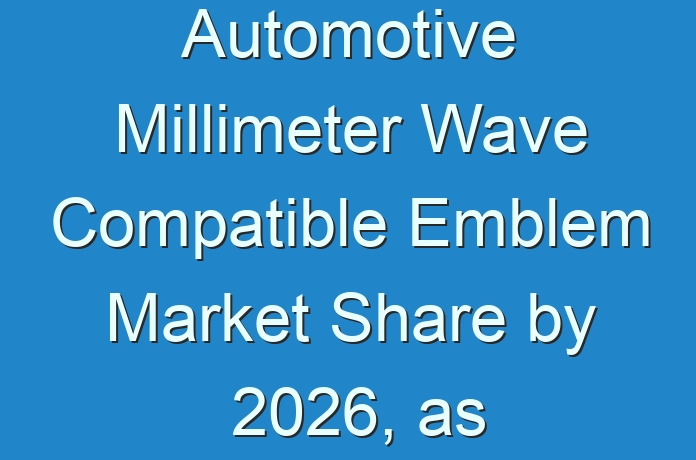
Global Automotive Millimeter Wave Compatible Emblem Market – Snapshot
The number of road fatalities worldwide is high. This is the primary factor prompting automakers to focus on minimizing the number of road accidents. This has led to incorporation of radar-based technologies in vehicles, which can alert, inform, or detect accident-causing elements on roads, including nearby vehicles and pedestrians. Millimeter wave radar is one of the crucial elements used in vehicles to detect and avoid vehicle collisions. Emblems are metal symbols installed on the front and rear side of a vehicle. These can be used as millimeter wave compatible devices to detect accident-causing elements in the surroundings of a car.
Want to know the obstructions to your company’s growth in future? Request a brochure @ https://www.transparencymarketresearch.com/sample/sample.php?flag=S&rep_id=61050
The global automotive millimeter wave compatible emblem market is primarily driven by advancements in the automobile technology, growing concerns about safety, and rising purchasing power of buyers of premium cars or autonomous cars. These factors are augmenting the sale of high-end and medium-range vehicles. Vehicles belonging to this class largely contain advanced driver-assistance systems (ADAS) that help in the evaluation of real-time location of other surrounding vehicles and that have safety features such as brake assistance, lane-departure warning, automatic emergency braking, pedestrian detection, adaptive cruise control, blind-spot detection, automatic high beams, and backup cameras. Several among these features have been made mandatory by governments and regulatory bodies across the world. Rules and regulations associated with driver safety augment the sale of automobiles with ADAS. For instance, in 2015, National Highway Traffic Safety Administration’s (NHTSA) New Car Assessment Program (NCAP) recommended use of lane departure warning systems and emergency braking in passenger cars. The European Union has already mandated the use of autonomous emergency braking systems, lane departure warning systems, electronic stability control, and automatic brake systems in vehicles.
Furthermore, lack of wide bandwidth in the 24-GHz band and rise in the need for high performance in emerging radar applications make the 24-GHz band unsuitable for new radar implementations. Hence, the 77–81 GHz short-range radar (SRR) band has been developed to enable long-range radar applications. The 76–81 GHz band is available for use in vehicular long-range radar applications. This bandwidth significantly improves range resolution and accuracy. Also, it offers the benefit of high Equivalent Isotropic Radiated Power (EIRP), which enables front long-range radar applications such as adaptive cruise control and all accident avoidance systems. Owing to this, the demand for development of 79-GHz-band, high-resolution, millimeter wave radar systems has risen among automobile manufacturers, as they wish to provide high-end vehicles with highly efficient and accurate accident avoidance systems to their customers. This factor is likely to drive the automotive millimeter wave compatible emblem market during the forecast period.
Looking for exclusive market insights from business experts? Request a Custom Report
Based on application, the market has been classified into passenger and commercial. The passenger segment is expected to hold a major market share during the forecast period, owing to extensive deployment of automotive millimeter wave compatible emblems on high-end passenger car brands of Toyota Motor Corp, Skoda Auto, Mazda Motor Corporation, and Buick.
In terms of geography, the global automotive millimeter wave compatible emblem market has been classified into North America, Europe, Asia Pacific, Middle East & Africa, and South America. Asia Pacific dominated the global automotive millimeter wave compatible emblem market in 2017, with Japan holding a major share of the market in the region, in terms of revenue. However, regulations imposed by the Federal Communications Commission (FCC) as well as governments in Europe regarding phase-out of the 24-GHz-frequency band and shift toward millimeter-wave frequencies are expected to make North America and Europe highly lucrative markets for millimeter wave compatible emblems during the forecast period.
Key players operating in the global automotive millimeter wave compatible emblem market and profiled in this report are TOYODA GOSEI Co., Ltd, Shinko Nameplate Co., Ltd., ZANINI AUTO GRUP, S.A., Toyota Motor Corporation, Shimadzu Corporation, and ROHDE & SCHWARZ GmbH & Co. KG.
Read Our Trending Press Release Below: https://www.prnewswire.com/news-releases/affordable-air-travel-and-technological-advancements-to-serve-as-prominent-factors-for-growth-of-airport-information-system-market-between-2020-and-2030-tmr-301181535.html





